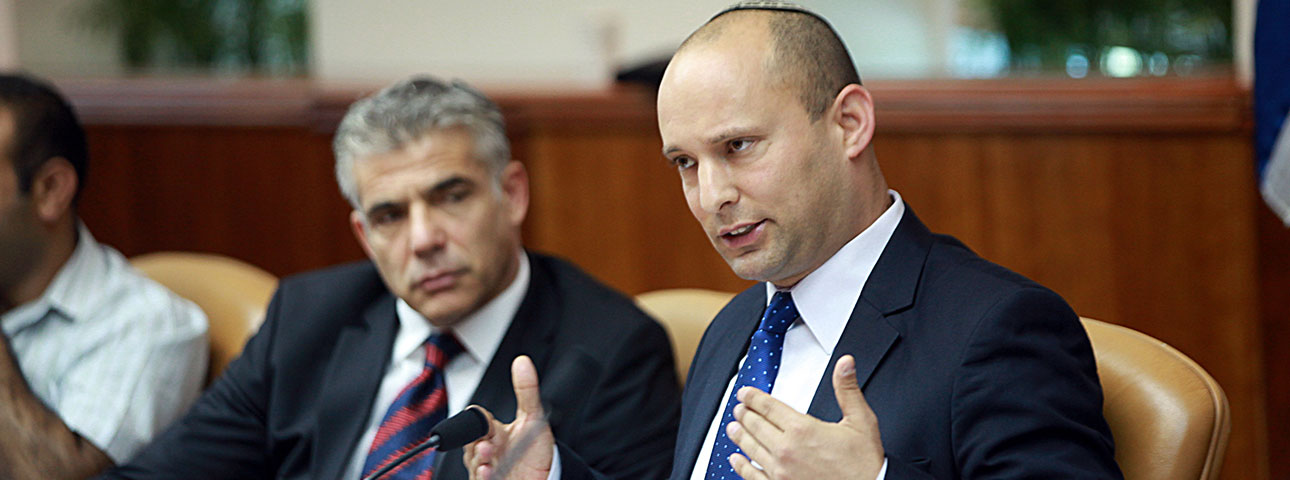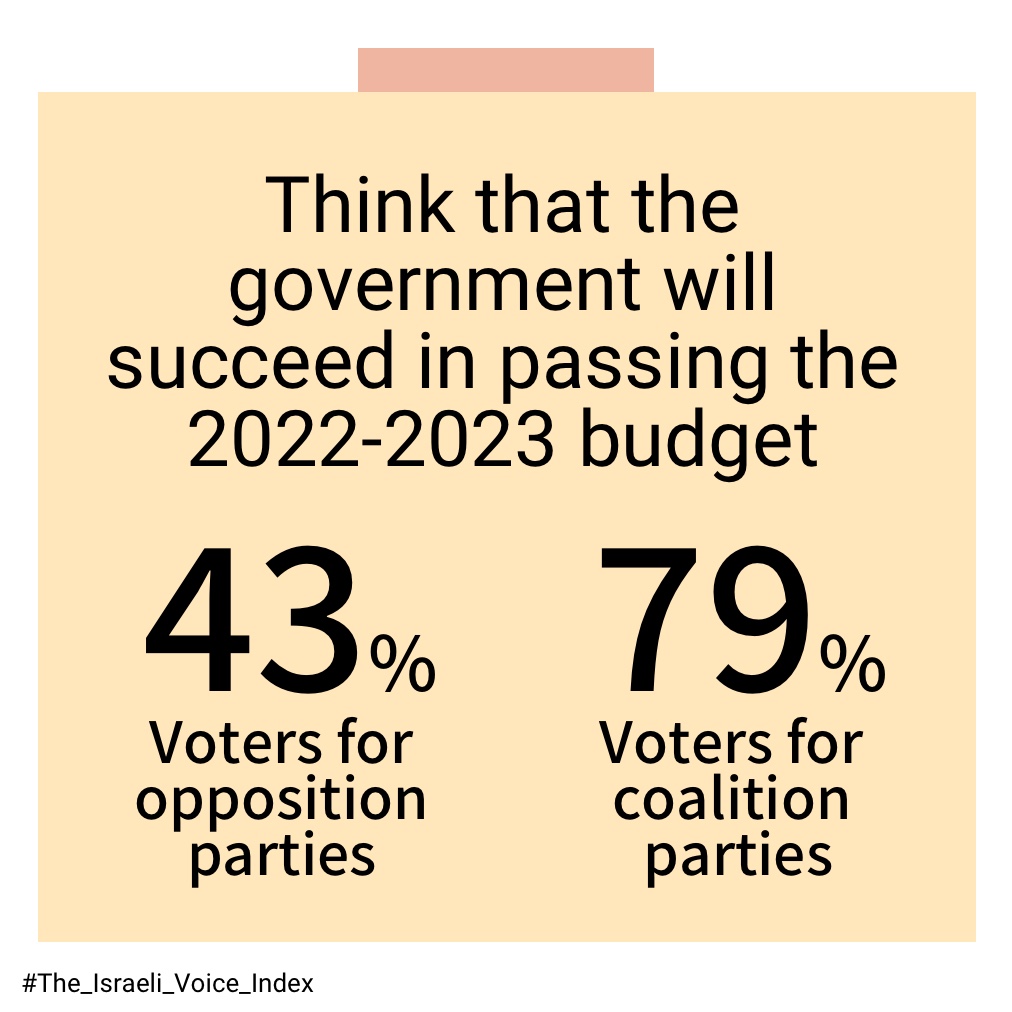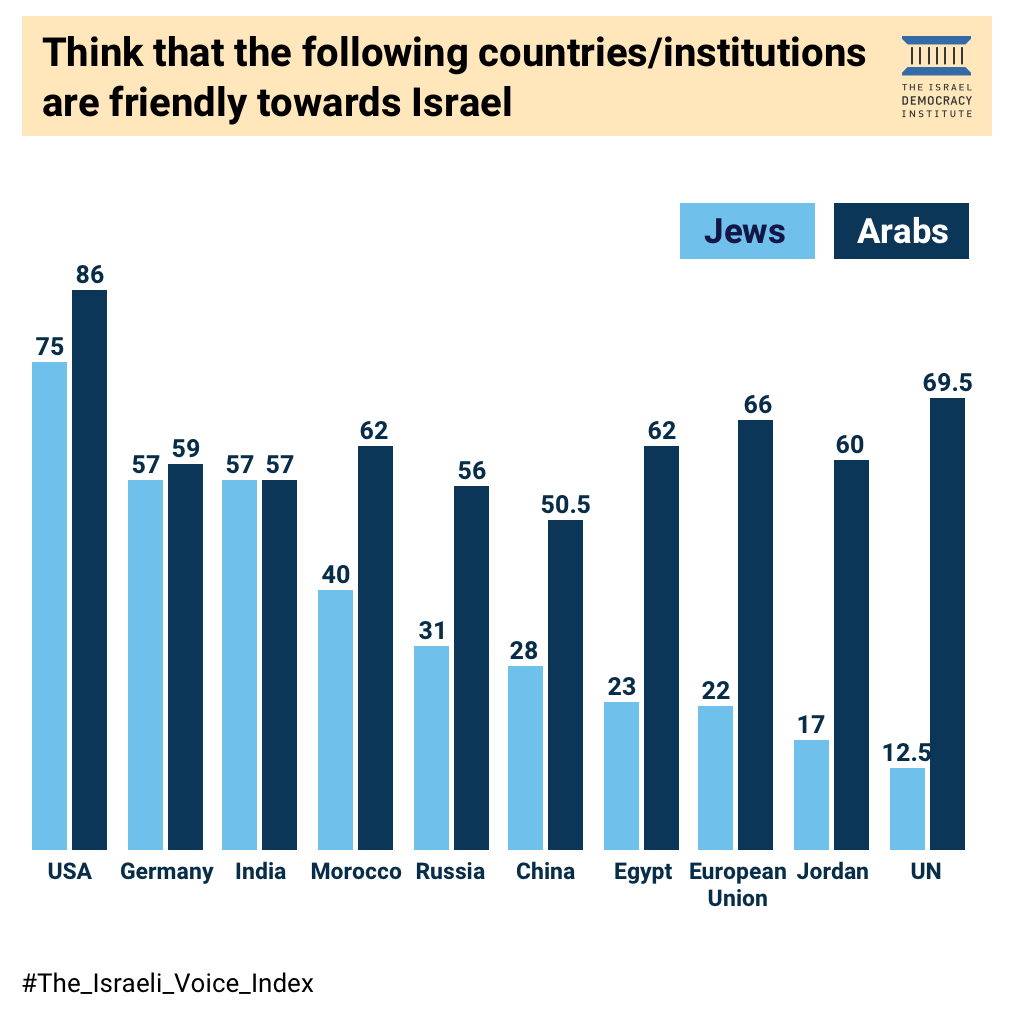Israel's International Standing Has Remained Stable Under the New Government
Most Israelis think that their country's international standing has either remained the same as it was under former Prime Minister Benjamin Netanyahu (37%) or improved (28%) since Prime Minster Naftali Bennett and Foreign Minister Yair Lapid assumed office.

Left to right: Foreign Minister Lapid, Prime Minister Bennett | Flash 90
Main Findings
* This month saw a sharp decline in the public’s optimism about the future of democratic governance in Israel and a slight rise regarding the future of national security. Only about a third are optimistic in the former sphere and about half in the latter one.
* The decline in the rate of optimists on the future of Israel’s democratic governance is indeed especially marked in the right-wing camp, but the left-wing and centrist camps, too, are “losing altitude.”
* A majority of the public as a whole believes the government will succeed to pass the 2022‒2023 budget in the Knesset and so will not fall.
* More than a third, the highest rate, of the public says Israel’s international status has not changed under the new government compared to the past, while the rest are divided fairly evenly between those who think it has improved and those who think it has deteriorated.
* On the left there is a sense of improvement, in the center a similar sense of improvement or stability, while on the right a feeling that the situation has worsened prevails.
* When asked about the degree of friendliness or hostility toward Israel of ten international organizations and states, the sample as a whole ranked the United States first as the friendliest and the United Nations last as the most hostile entity. Among the Arab countries that we asked about this time, Morocco is perceived as the friendliest.
* On this question we found a very large gap between Jews and Arabs: the Arabs assess the degree of friendliness of all the organizations and states as higher than the Jews do.
* An analysis of the three political camps yields a similar result: the left views the states and organizations we asked about as friendlier toward Israel than do the other two camps.
* The public is divided on the need for a military broadcast station like Galei Tzahal. There is also no clear public position on whether the station’s broadcasts are currently politically neutral or biased to one side or the other.
The National Mood
After four months in which the degree of optimism about the future of democratic governance in Israel was quite stable, this month saw a significant decline (from 48% to 35%); that is, only about a third of the interviewees are optimistic about the future of Israeli democracy. However, a slight increase occurred in the public’s optimism about the future of Israel’s national security compared to the previous months, and at present about half of the public are optimistic. This is still, however, a lower rate than those that were measured from January 2020 to April 2021.
Optimistic about the future of Israeli democracy and about the future of national security, April 2019 – October 2021 (%, entire sample)
A segmentation of the degree of optimism about the future of Israel’s democratic governance since February 2021, from the elections to the 24th Knesset until the present, reveals great volatility in the Jewish public according to political camp. On the right, optimists were a majority before and immediately after the elections, but after the new Bennett-Lapid government was formed the optimism waned and it has remained relatively low. This month, apparently in tandem with the assessment that the government will be able to pass the budget and will not fall in the near future, saw the lowest rate of optimism measured in this camp: less than a third of the right are optimistic. In the center and on the left, a reverse process occurred; while up to May 2021 only a minority in these political camps were optimistic about the future of democracy, after the emergence of the new government a substantial rise occurred in the degree of optimism, with the peak being reached in July 2021 about a month and a half after the government’s establishment (71% of the left and 64% of the center were then optimistic about democracy’s future).
However, since that measurement the degree of optimism has steadily decreased in those two camps, and at present only about half of the center (49%) and less than that on the left (38%) are optimistic; in other words, even if reasons for the pessimism are different, these camps have converged somewhat in their degree of pessimism about the future of Israeli democratic governance.
Optimism about the future of democratic governance in Israel, February 2021‒October 2021 (%, Jews, by political camp)
As for the Arab public, in all the recent months only about a third have been optimistic about the future of Israeli democracy, with particularly low values measured in May after Operation Guardian of the Walls (25%). With the formation of the Lapid-Bennett government a certain increase occurred in the degree of optimism (40%‒42%), but this month it disappeared and only 29% responded that they were optimistic. Particularly notable is the low degree of optimism among voters for Ra’am (25.5%), which is part of the current coalition.
Will the Budget Be Approved?
Three and a half years since the last time a state budget was approved in the Knesset, and after the failure to pass the budget a year ago led to the breakup of the Netanyahu-Gantz parity government, the majority of the interviewees (61) believe the Bennett-Lapid government will succeed in the coming month to pass the 2022‒2023 state budget in the Knesset.
Among voters for the coalition parties, a large majority (79%) thinks the government will be able to get the budget through the Knesset. Among voters for the opposition parties, though, only 43% think so. Note that among voters for Ra’am, which is, of course, a member of the coalition, only a minority estimates that the budget will pass (41%). However, a majority of voters for both the Religious Zionism Party and the Joint List expect it to be approved—in contrast to the minority among the rest of the opposition parties.
Sure or think the government will succeed to pass the 2022‒2023 state budget (%, entire sample, by voting in the latest elections)

Foreign Policy
One of Prime Minister Netanyahu’s strong points was his strong status, and, as a result, Israel’s status as well in the international arena. We wanted to know how the public perceives Israel’s international status at present under the leadership of Naftali Bennett and Yair Lapid. We asked: “Prime Minister Bennett and Foreign Minister Lapid are investing great effort in strengthening ties with international leaders and explaining Israeli policy. In your opinion, is Israel’s current status in the international arena much better, moderately better, the same as it was, a little worse, or much worse?” Among the Jews, we found, the most common position (37%) is that no change has occurred in Israel’s international status, while almost the same rate thinks it has improved or deteriorated (27% say it has improved and 30% that it has deteriorated under Bennett and Lapid). In other words, the Jewish public does not hold a single clear impression of the situation in this regard. The distribution among the Arab interviewees is similar, though slightly more positive: 40% consider that the status has not changed, 30% that it has improved, and 23% that it has worsened.
A segmentation of the responses to this question by political camp (Jews) yields a clear picture: on the left there is a sense of improvement, in the center there is equivalence between those who see an improvement and those who believe Israel’s international status has remained as it was, while on the right there is a majority for those who assess that the status has worsened.
“In your opinion, is Israel’s current status in the international arena…” (%, Jewish sample, by political camp)
Who Is an Enemy and Whose Is a Friend in the International Arena?
Every few years we try to map Israelis’ attitudes toward international entities and different countries of the world in terms of their friendliness or hostility toward Israel, against the backdrop of the changes in the international arena. This time we looked into ten organizations and states. The most friendly among them turned out, not surprisingly, to be the United States, toward which the public’s uncertainty is also the smallest (only 3% chose the “Don’t know” option). The entity perceived as the most hostile is the United Nations. Among the Arab states (Egypt, Jordan, and Morocco), Morocco is perceived as the friendliest.
Is each of the following organizations and states friendly or hostile toward Israel at present? (%, entire sample)

We found, however, large gaps between Jews and Arabs in this regard. The Arabs ascribe to all of these entities a much higher degree of friendliness toward Israel than the Jews do. Only in the case of India are the Arabs’ and the Jews’ assessments the same, and they are similar as well regarding Germany.
Think each of the following organizations and states is friendly toward Israel at present (%, Jews and Arabs)
A segmentation of the Jewish sample by political camps shows that in all of the camps the US comes out on top, though with considerable disparities, while for all three camps the UN is the least sympathetic entity. Generally the left, somewhat like the Arabs, looks more positively upon all the entities compared to the center and the right; that is, it sees the world as friendlier toward Israel than do the other two political camps.
Think each of the following organizations and states is friendly toward Israel at present (%, Jews, by political camp)
Galei Tzahal – All the Time?
Is there a need for a military broadcast station? The Israeli public is divided on the question of whether there is or is not a need today for a military broadcast station like Galei Tzahal: 45% of the Jewish interviewees think there is a need for such a station while 41% say there is no need for one. In the Arab public more than half consider that there is no need for such a station (55%) compared to about a quarter (26%) who think there is a need for it. A segmentation of the Jewish sample by political camp and by location on the Haredi‒secular spectrum reveals that there is no group in which there is a majority that thinks or is sure there is a need for a military station like Galei Tzahal.
At the same time, a segmentation of the Jewish sample by age turns up such a majority among young people (18‒24) – 56%, compared to a minority among the other age groups.
Is there a need today for a military broadcast station? (%, Jewish sample, by age)
Is Galei Tzahal politically neutral? Less than a quarter of the interviewees (22%) see the broadcasts on Galei Tzahal as politically neutral, 14% feel that the station’s broadcasts tend to the right, about a quarter that they tend to the left (24%), and a high rate do not know (40%).
A segmentation of the Jewish sample by political camp shows that among those who identified themselves as right-wing, more than a third think the broadcasts on Galei Tzahal tend to the left compared to 7% who say they lean to the right and 22% that they are neutral; in the center, the same rates think the broadcasts tend to the left and to the right (14% and 14.5%); on the left, a minority (16%) considers that the broadcasts tend to the left, and a slightly higher rate that they tend to the right (22%). In other words, today the station does not have a clear political “color.”
Are Galei Tzahal’s broadcasts neutral or do they tend to the political right or left? (%, Jews, by political camp)
There is a strong link between the degree to which Galei Tzahal is perceived as politically neutral and the need for the station’s existence at present. Two-thirds of those who think the station is neutral believe there is a need for it, compared to a little less than half of those who think its broadcasts tend to the right and less than a third of those who say its broadcasts tend to the left.
Is there a need today for a military radio station? (%, entire sample, think/are sure there is a need, by degree of neutrality)
The Israeli Voice Index for October 2021 was prepared by the Viterbi Center for Public Opinion and Policy Research of the Israel Democracy Institute. In the survey, which was conducted on the internet and by telephone (supplements of groups that are not sufficiently represented on the network) from October 24 to 27, 2021, 602 men and women were interviewed in Hebrew and 150 in Arabic, constituting a representative national sample of the entire adult population of Israel aged 18 and older. The maximum sampling error for the entire sample was 3.59%± at a confidence level of 95%. The fieldwork was done by the Midgam Institute. For the full data file see: Data Israel.
